‘MY NAME WAS PETAR!’ Life story of Aleksandar Karađorđević: ‘He came and said that I am his HALF-BROTHER, as Jovanka Broz told me
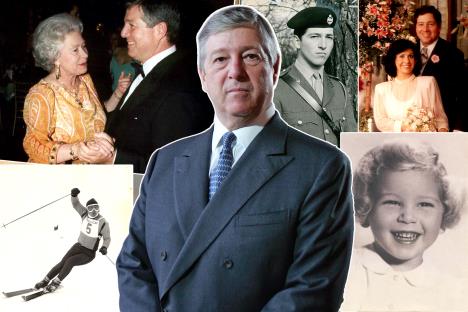
MY LIFE STORY
“I was born on 17 July 1945 in apartment 212 of the Claridge's hotel in London, which Winston Churchill and the British government temporarily declared Yugoslav territory at the request of my father, King Peter II, so that the heir to the throne could be born on the soil of his homeland. According to some stories, soil was even brought from Yugoslavia and placed under the bed on which my mother, Queen Alexandra, daughter of Greek King Alexander, was lying. Although childbirth is expected to be an intimate event, it was anything but, as there was also a commission from the Yugoslav government present to make a report that everything was in order, which is customary when a child is born into a royal family,” begins the life story for Kurir of Crown Prince Aleksandar Karađorđević.
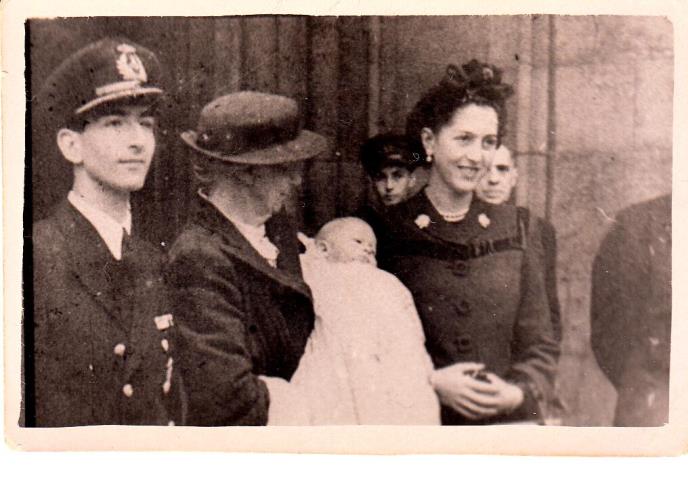
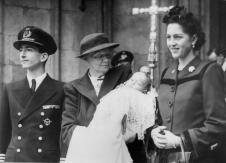
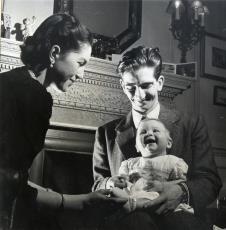
“I was first given the name Petar, which was temporarily given to me by the court priest Bishop Firmilijan Ocokoljić until my baptism, as a name in testament, in accordance with the customs of our people. In October of the same year, I was baptised at Westminster Abbey, and the holy sacrament was performed by Patriarch Gavrilo and Saint Bishop Nikolaj Velimirović, while my godparents were King George VI and his daughter, the now deceased Queen Elizabeth II. Her Majesty later told me that I was a very heavy baby and that she almost dropped me because I was very slippery due to the copious amounts of oil I was anointed with. To this day, I hear that I was not baptised according to Orthodox customs. However, these two archiereuses of our church had a bit more theological knowledge of what is according to Orthodox canons and what is not
“World War II had just ended, but some other hidden wars were just beginning. At just one and a half years old, in March 1947, I was declared a state enemy; I was such a dangerous baby that you cannot even imagine... My early childhood was marked by travel and relocations. Although my family had been deprived of the right to return to the country, my father continued to perform his duties as king and help his people.
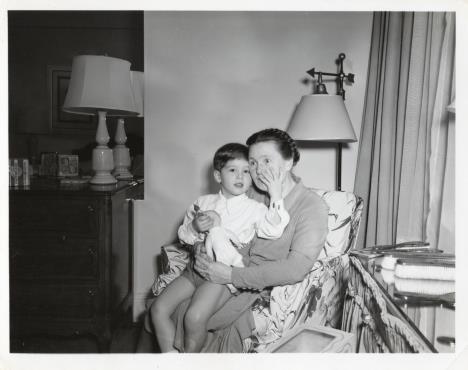
“We moved to St. Moritz in Switzerland in 1946, then later to New York, where I attended the first school, Trinity. I remember, I was not yet seven years old when my nanny, a caring Irishwoman, told me in the living room about the death of my godfather, British King George VI, who was relatively young, not yet 60. Another time, nothing unusual about children being told about difficult topics. I was in New York until 1952, when I joined my parents in Paris and then continued my schooling in Switzerland.
“Life was not easy. The communists confiscated all the family’s property. Nevertheless, my parents were determined to give me the best possible ‘understandable, practical, constructive education’, as my father wrote in his memoirs, where he also described me as: ‘… although in classes as lazy as I was, he is exceptionally bright, capable, and very lively. Like me, he loves all things mechanical and is an enthusiastic sportsman."

“Our travels became increasingly difficult as my father’s last ambassador died in Spain in the early fifties. We had no nationality, and as more and more countries recognised the new communist state, we could not renew our passports. We travelled only with a sheet of paper, and instead of a visa, it read: ‘No objections...’
“Since my father thought I needed more discipline, I left the Swiss school Rosey for the military academy Calver in Indiana, USA. I liked it very much, and we still maintain good contact, sending one student from Serbia to their summer programme. I came to Paris for Christmas, my father met me at the airport, and I had a modern hairstyle, chewing gum, and wearing a T-shirt instead of a shirt. My parents didn’t like that, so I was sent to Gordonstoun school in Scotland, in the middle of nowhere. A boarding school like you see only in old films, with jackets in school colours, ties tied with the same knot... It was a big change, but I spent a lot of time there with Prince Charles. Besides being relatives, we became friends, and he was and remains a true gentleman. Now he is an outstanding king.
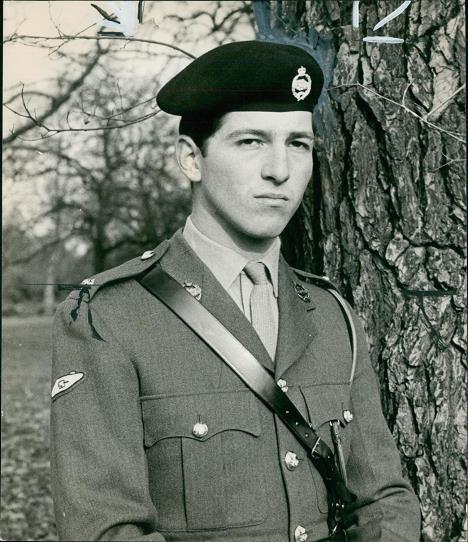
“It was impossible to transport my father’s body to England, so we tried a compromise to have the funeral in Libertyville, but with Bishop Firmilijan serving along with the schismatic bishops. But after the word of the funeral ban, we gave up; we did not want incidents or a circus. My mother and I, as well as the whole family, were very sorry that we could not attend the funeral.
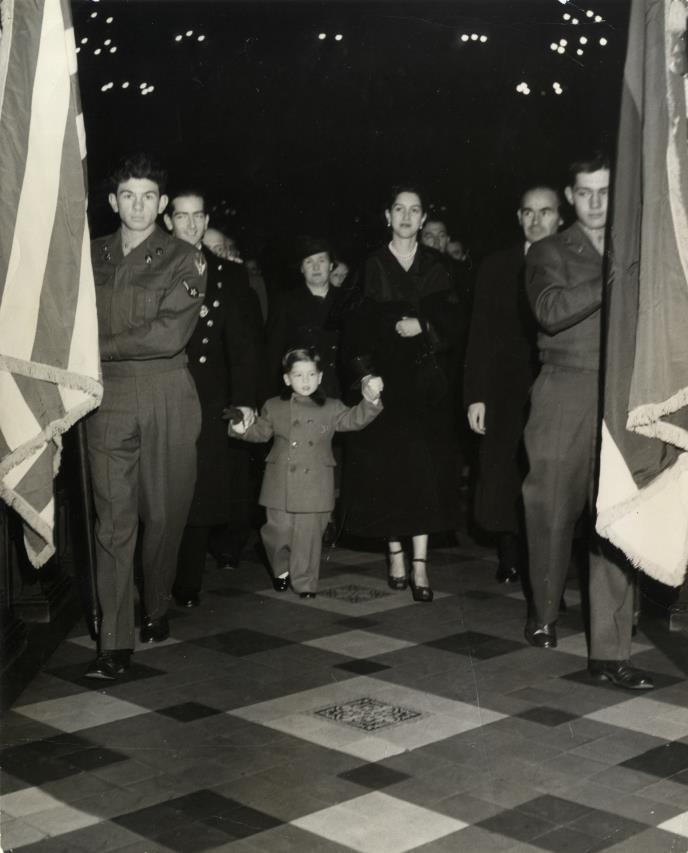
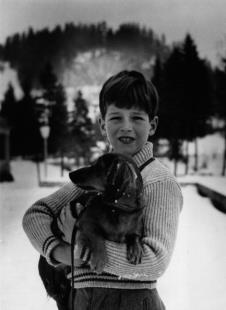
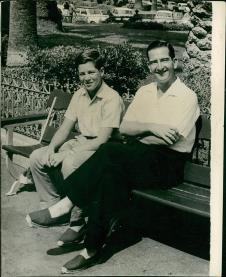
“In 1970, when my father passed away, I became the head of the royal house, and many addressed me as king, which was a natural progression. However, I decided to continue using the title of Crown Prince, as the title of king does not mean much while I am in exile. Nevertheless, I made it very clear that I was not renouncing the title or the dynastic right to the throne, but only the use of the title of king. A constitutional parliamentary monarchy is an excellent system that brings continuity, stability, and unity; I am ready to assume the proper title as soon as the people of Serbia express their desire for it.
“The only thing returned to me from everything that was seized from the family was a book. And this happened when I was serving as an officer in the British Army in West Germany, in a small town near the border with East Germany. I spent my free time at the local ski resort, on the barium slope, where an incredible trail was left when skiing at night. A German border guard approached me and asked if I was the son of the Yugoslav king, and said that his father would like to see me. We arranged a meeting at a local restaurant. In the evening, an older gentleman arrived, handed me a bag, and said: ‘This is yours.’ I looked at him in astonishment, as it was the first time I had seen him, and he said: ‘As a Wehrmacht soldier during the war, I served in the command that occupied your father's palace. I took this book from his library. I want to return what belongs to you.’ The book did indeed have a stamp from the family home’s library. It travelled with me around the world wherever I went, and finally came home in 2001 when we returned to Serbia.
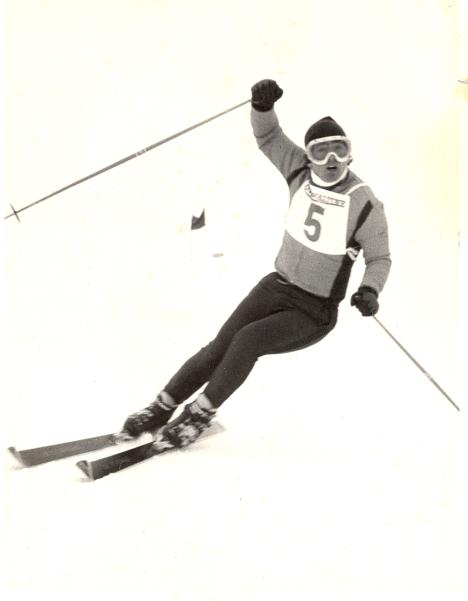
“In 1972, I won the British Army skiing championship, and that year I also left military service to focus on my business career. That same year, I married Princess Maria da Glória de Orleans e Bragança from the Brazilian imperial family. We lived in Brazil, where I worked for a marketing firm and then for London Assurance. We moved to Chicago in 1976, where I was offered a job, also in insurance. Eventually, I received an offer from competitors in Washington, and as the company had a branch in London, it was decided that I would work there. I moved as better and more challenging jobs came up.
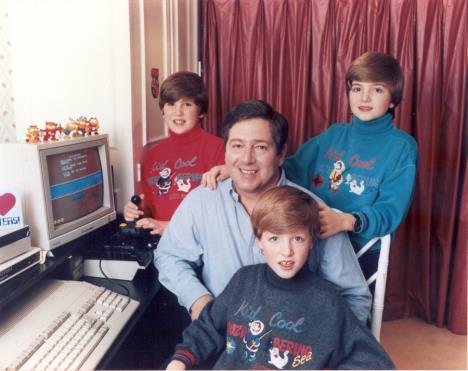
“We had our eldest son, Petar, in 1980, and twins Filip and Aleksandar in 1982. We lived like any other family. I had to put bread on the table and ensure my children had everything they needed. And what tall tales they told about the ‘gold that the Karađorđević’s took’...
“The marriage ended in 1983, but it was a civilised separation, and we remained on good terms. Princess Katarina, born in Athens, and I married in 1985 at the Serbian Orthodox Church in London. The godfather was King Constantine of Greece, and the second witness was my uncle Tomislav. In London, we bought an apartment, and then a house, which we later sold to restore the Royal Palace when we finally moved to Serbia. My sons joined us in 1985; we were together as they grew up, through their schooling and universities. At six years old, they began attending one of the best preparatory primary schools in London, and at 13, one of the best boarding schools - the King’s School in Canterbury. Petar graduated in 1998, and Filip and Aleksandar in 2000. They all went to different universities.
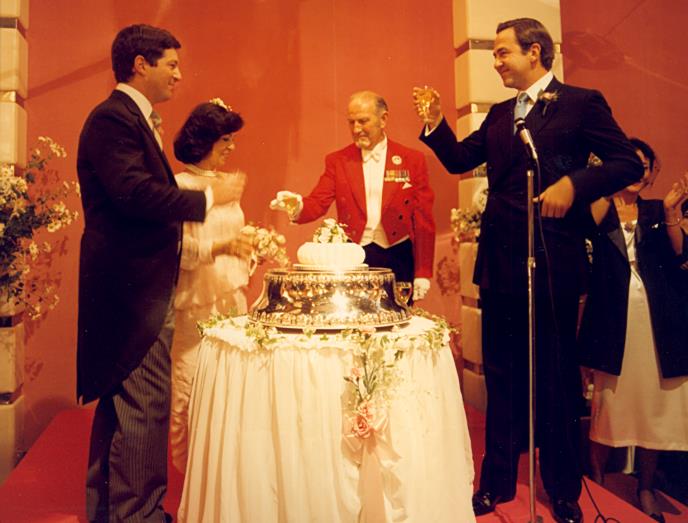
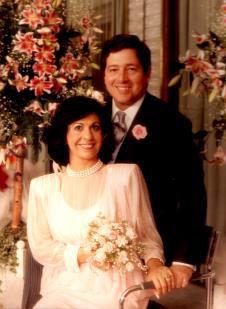
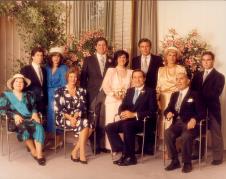
“In 1990, I visited Hilandar for the first time, where I planted an olive tree, as only the fourth person to receive that honour from the monastery, after Emperor Dušan, King Alexander Obrenović, and King Peter I. One of the greatest honours for me. It was a time before mobile phones, the brotherhood did not know exactly when we would arrive, the journey was not easy, so a young novice rang the bell to announce our arrival from dawn until we appeared before the walls. Incidentally, in 2023, when I visited Hilandar for the third time, I saw him at the monastery; he is one of the oldest monks.
“My wife, Princess Katarina, my sons, and I first set foot in our country in October 1991. We did not have Serbian documents, so when we landed in Surčin, I told the police officer: ‘My face is my passport’ and simply walked through. He was astonished.
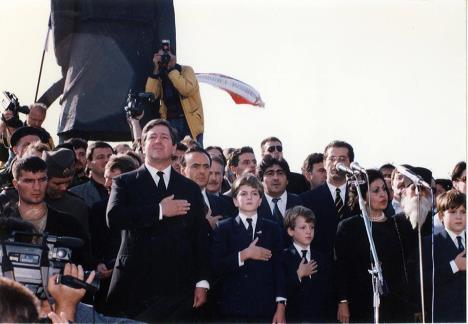
“The first visit to the homeland was incredible, with hundreds of thousands of people, and the drive from the airport to the city took hours, with the streets full. Very emotional. The next day, I visited my grandfather’s grave for the first time. I felt at home. And then addressing the people in front of the Church of Saint Sava, where my son Petar also spoke... My wife and I later donated funds for the doors of this sanctuary, and one of the major donours at a dinner we organised in New York was the now-late Ivana Trump, Donald Trump’s former wife. We met them long before he entered politics.
“Then the regime in 1991 set up blockades to prevent people from entering Belgrade. Since we came at the invitation of the democratic opposition, due to rising tensions and fearing for the safety of those supporting us, we had to return to London, although thousands of people shouted: ‘Stay, stay.’ But I came again around Saint Vitus Day in 1992 when I joined the large demonstrations against the regime. My role as a member and elder of the royal family obliges me to be above politics, but I am a strong advocate of democracy and human rights, so participating in the 1992 demonstrations was not supporting any party but fighting against dictatorship.
“Incidentally, in the late eighties, Princess Katarina and I attended a diaspora gathering in northern Canada, very far from any major city. A well-dressed, polite man approached me, saying he had something important. He talked about himself, about a very successful company, and suddenly said he was my long-lost half-brother! We were shocked, and he continued: ‘My mother (he mentioned a name) was a school friend of your father, and you know, they liked each other...’ I knew it was all fiction, but doubt wouldn’t let me rest, so I checked with my father's old teacher. He assured me that neither that girl nor anyone else from my father’s circle had become pregnant. Years passed, and at a gathering in front of the National Assembly in Belgrade, in the parade in front of the stage, dressed in what can only be described as a strange uniform, the kind that communist propaganda falsely portrayed Chetniks of Draža Mihailović – there he was! The man from Canada! He caught me staring at him, and quickly disappeared into the crowd. That was the Secret Service, he got a new assignment!
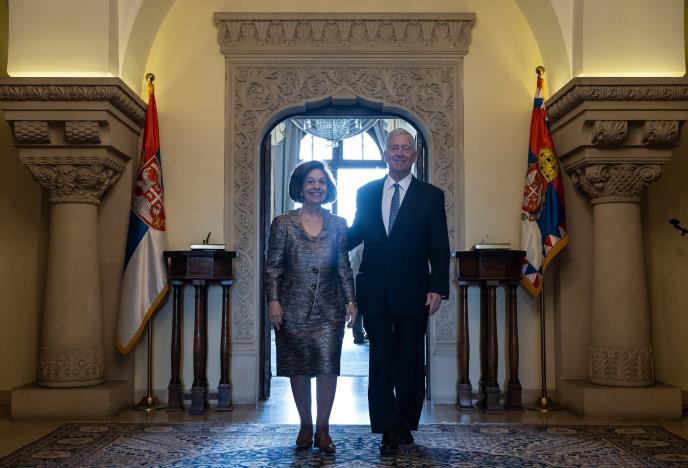
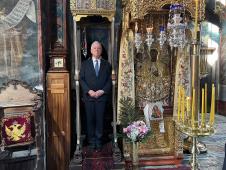
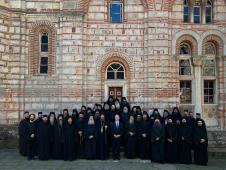
“When the dreadful war in the former Yugoslavia began, Princess Katarina and I were determined to help our people. That is the duty of the Karađorđević’s. And a large number of our friends in the diaspora were firmly resolved to join us, so Princess Katarina started the humanitarian organisation Lifeline. I always supported my wife in this path of charity, and I am very proud of all the lives saved and improved.
“I remember all the attempts to avoid or end the war earlier. I became friends with Cyrus Vance, the US Secretary of State under Jimmy Carter. At that time, he was a UN representative, and during lunch, he told me, ’I'm going to Belgrade to meet with Milošević,’ and upon his return, he described in detail the golden salon of the White Palace, where he met him. Vance said to him, ‘Mr. Milošević, it is very important that you work on developing democracy, which is the future. There is no place for totalitarian governments.’ Milošević's response was, ‘I don't know what you mean, Mr. Vance, we have 100 political parties.’ Cyrus asked me, ‘What could I have said to him?’ and I replied, ‘You should have told him - most of those parties were created by you.’
“I still regret that I couldn't do more in 1999, but some decisions had already been made. At the funeral of my dear friend King Hussein in Jordan, in February 1999, when the negotiations in Rambouillet were not going well, I saw Bill Clinton: ‘Mr. President, I heard you want to bomb my country, please don't do it! It will only bring disaster to innocent people, destroy the country, and you won't harm Milošević.’ He turned to his National Security Advisor Samuel Richard Berger: ‘Sandy, explain to the prince what will happen,’ to which Berger said to me, ‘Oh, we'll have a short campaign, the bombing will last only a few days.’ I responded, ‘Not even a millisecond!’ Upstairs in the Jordanian palace, I saw Tony Blair, whom I knew from London, and Jacques Chirac on a couch. I sat between them and said the same thing. Blair was unwavering, but Chirac said, ‘Come to Paris, let's talk, let's try to find a solution.’ Unfortunately, his willingness for talks was overruled by those who wanted conflict.
“After the bombing ended, my wife and I managed to go to Kosovo. The memory of Patriarch Pavle greeting us in front of the Patriarchate of Peć with a scorched icon in his hands is still very vivid... The places looked completely deserted; people hid until they heard church bells, then came out.
“When we came to the funeral of my uncle, Prince Tomislav, in July 2000 at Oplenac, we didn't have passports, so I said again, ‘My passport is my face!’ Interestingly, when we returned immediately after October 5th, the same people who asked for my passport in July welcomed us at the airport with the words, ‘Welcome! We're glad to see you.’ Then the late Zoran Đinđić, otherwise a republican, a great friend who made tremendous efforts to enable our return to the homeland, said, ‘Let's get in the car, you're going to your home in Dedinje.’ I said, ‘Zoran, please - no! We've waited so long, I want everything to be according to the rules and official.’ And very quickly, on February 27, 2001, the National Assembly of Yugoslavia annulled the decree from 1947, restoring our citizenship. Shortly after, in apartment 212 at the Claridge's Hotel, where I was born, we were handed our passports. Interestingly, at that very place in 1995, for my 50th birthday, my wife organized a beautiful celebration attended by Queen Elizabeth II. Her Majesty asked me what my birthday wish was, and I said, ‘To be at home, with my people, in my country.’ That wish came true, and on my birthday - July 17, 2001, we entered the home my grandfather built for his family - the Royal Palace. You can't imagine the flood of emotions... All those rooms described to me by my grandmother, Queen Maria, and my father, the pictures I had only in my mind and from a few old photographs, became real. I tried to work out which room was my father's, where he slept...
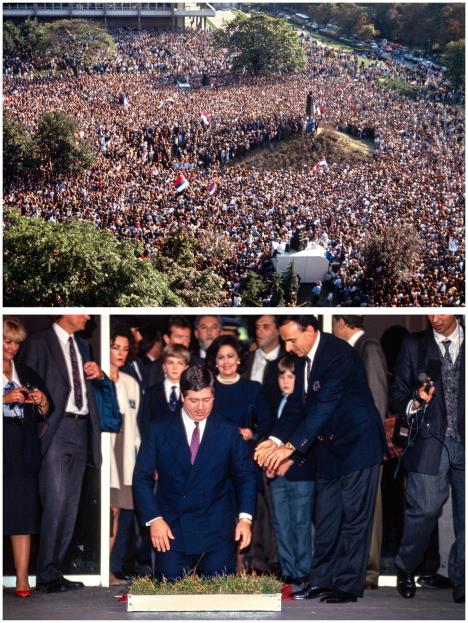
“After a month, I discovered that our neighbour was Tito's widow, Jovanka Broz. I thought it would be nice to meet her. Why not? We are friendly. The visit was supposed to last an hour, but we stayed for three. By the way, there is a bullet hole in the forehead of our Lord in the palace church. My wife asked, ‘Excuse me, Jovanka, was it your husband who fired the bullet at Christ's forehead?’ and she replied, ‘No, Katarina, he wasn't that bad,’ and we all laughed.
“The next winter was very harsh, icy. Jovanka called: ‘Excuse me, I need your help, there's no heating.’ I called Prime Minister Đinđić: ‘Excuse me, Zoran, my neighbour has a problem, the central heating doesn't reach her. It would be good to help because it would be tragic if we ended up with a frozen dictator's widow.’ And he resolved it.
“When the princess and I were guests of Vladimir Putin in Moscow, during lunch at the Kremlin, he said, ‘Did you know I slept in your house just before you came to Serbia? You don't have to worry; there are no more listening devices, we've removed them all,’ to which I said, ‘Mr. President, thank you very much, that's wonderful of you. But what about your devices, did you leave them?’ He laughed sincerely.
“A historical injustice was corrected in 2013 when I could finally fulfil my father's vow - to bring him back to Serbia, even if dead. On May 26, 2013, the remains of my father, King Peter II, my mother, Queen Alexandra, my grandmother, Queen Maria, and my uncle, Prince Andrew, were transferred and buried in Oplenac. A mixture of sadness and happiness.
“During our life abroad, I hoped that the Karađorđević’s would marry, be born, and grow up in Serbia again, but I couldn't fully believe it. When it finally happened, I can't describe the joy... My son, Crown Prince Philip, married my daughter-in-law, Princess Danica, on October 7, 2017, at the Cathedral Church in Belgrade. Then my grandson, Prince Stefan, was born on February 25, 2018, and christened in the Palace Church in December of the same year. Then, on November 5 last year, my granddaughter, Princess Maria, was born, and christened in the Palace Church in May. My nieces, Princesses Isidora and Natalia, daughters of my cousin Prince Michael, were also born here.
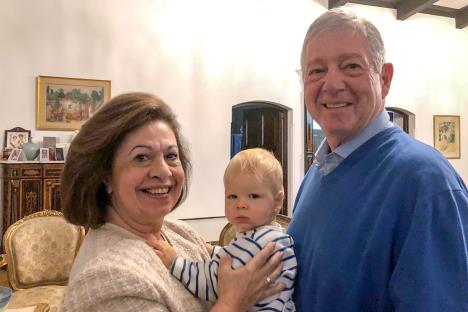
“How do I see myself in the future - the role of every member of the Karađorđević royal family has always been the same - to serve the people of Serbia and our homeland. We owe it to our ancestors to continue their legacy, but also to future generations to ensure a good and stable country they will continue to build. As our family motto says, ‘From the people - for the people!’ “
We are now awaiting the documentary series Crown, State, People, in which, we believe, there will be many more interesting stories
It is prohibited to take any part or the entire text and/or photographs/videos without citing and linking the source and author, in accordance with WMG's Terms of Use and the Law on Public Information and Media.









